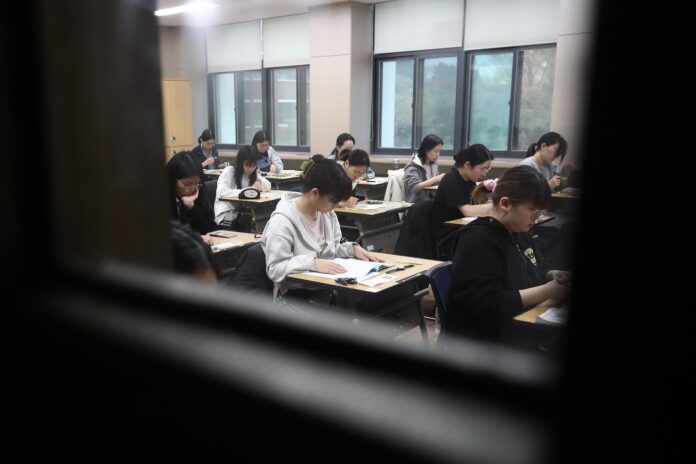The incident “is a preposterous mistake” that must not be repeated, the students’ attorney, Kim Woosuk, said in a news release this week.
In South Korea, the annual exam known as the Suneung is a serious matter.
Many students spend most of high school — and thousands of dollars a year — preparing for the highly competitive exam. Thirteen-hour days spent mostly on academics and test prep that end at 10 p.m. are not uncommon. Hiring private tutors or going to expensive after-school prep academies known as hagwons is the norm.
On test day, usually in November, airports halt takeoffs to reduce noise so that tens of thousands nationwide can focus on their half-hour English listening exams. Offices delay the start of work to clear morning traffic for students rushing to their test sites. The military draft board takes a day off. The stock market opens an hour later.
The test itself is a grueling nine-hour struggle, which includes a 50-minute lunch break and a few 20-minute bathroom breaks in between subjects that include Korean, English, math, Korean history and science.
In the weeks leading up to the test, students take pains to eat and sleep right, like athletes before a big game. Mental breakdowns during the test are not unheard of, and getting sick in between subjects is common.
Kwon Ji-sook, 52, the mother of one student, said her son had made a habit of eating a vegetable-focused diet in the months before the exam and had practiced with analog watches for a year because electronic devices aren’t allowed at test sites. All that training was upended by the proctor’s mistake, she lamented in a phone interview.
But why all the Suneung stress?
If students botch the test, they must wait whole year to retake it, adding more pressure to perform. Only high school seniors or high school graduates can take the exam.
Small test-score differences, meanwhile, often determine how prestigious a college a student can attend. Going to a top school means better lifetime wages, according to multiple studies. A study published by the Korean Economic Association this year said top-tier college graduates made 24.6 percent more in their first jobs than the graduates of the lowest-tier colleges and as much as 50 percent more in their early 40s.
The approximately $15,000 that Kim’s clients are asking for is the estimated cost of spending another year preparing for the Suneung exam, Kim says.
An official at the Seoul Metropolitan Office of Education, who spoke on the condition of anonymity to freely discuss the matter, acknowledged that there had been a mistake and said the administrator responsible for the blunder had been given a written reprimand.
Officials gave the students an extra 90 seconds during lunch time to fill in blank answer sheets but didn’t permit them to change already filled-in marks. That didn’t help students who made a last dash to mark remaining questions in a straight row rather than leave them blank, Kim said.
This isn’t the first time test administrators have jumped the gun. In 2020, a supervisor ended a Suneung subject test three minutes early, triggering a lawsuit. An appellate court awarded each of the eight students $5,300 in damages this year.



